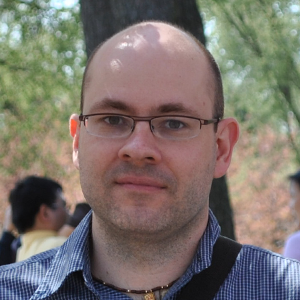Tesmer wins ASBMB Young Investigator Award
John Tesmer, a research associate professor at the Life Sciences Institute and the department of pharmacology at the University of Michigan Medical School, has been named the winner of the 2010 American Society for Biochemistry and Molecular Biology Young Investigator Award (formerly known as the ASBMB/Schering-Plough Research Institute Award), which honors outstanding research contributions to biochemistry and molecular biology by individuals who have no more than 15 years of postdoctoral experience.

Tesmer will present an award lecture titled “Structural Analysis of Heterotrimeric G Proteins and G Protein-Coupled Receptor Kinases” at 8:30 a.m. Monday, April 26, at the 2010 annual meeting in Anaheim, Calif.
G protein-coupled receptor signaling pathways are responsible for a wide range of intracellular events and are an intense area of biological and pharmaceutical study. Researchers studying GPCR owe a lot to Tesmer and his group, who provided insight into GPCR signaling through their structural and functional analyses of G proteins.
Tesmer’s impressive array of contributions began in 1997, when he solved the atomic structure of RGS4 in a complex with Gαi1 while he was a Howard Hughes Medical Institute postdoctoral fellow working with Stephen R. Sprang at the University of Texas Southwestern Medical Center at Dallas. This was the first structure of a regulator of G protein signaling, as well as the first structure of an RGS protein in complex with its target. Shortly thereafter, Tesmer solved the crystal structure of Gαs, both alone and in complex with the catalytic domains of adenylyl cyclase, the latter providing the first structure of a G protein-effector complex.
Since then, Tesmer, who double majored in biochemistry and English at Rice University and received his doctorate in biological sciences from Purdue University, has never looked back.
“Protein crystallography is often an extremely time-consuming, high-risk approach to answering questions about the molecular mechanisms of signal transduction,” said University of Michigan colleague Alan R. Saltiel. “However, in a very short time [John] has elegantly addressed many fundamental questions of heterotrimeric G protein signal transduction. His success is a clear demonstration of his perseverance, expertise, clear-mindedness and ability to effectively synergize with collaborators.”
Sprang, currently a professor and director of the Center for Biomolecular Structure and Dynamics at the University of Montana, agrees wholeheartedly. “Tesmer was among the most productive and creative postdoctoral fellows with whom I have had the honor to work,” he said. “Since he began his independent career as a junior faculty member at UT-Austin, and now at the University of Michigan, John has become a recognized leader in the structural biology of G protein signaling. Indeed, I would say with confidence that he is currently the most productive structural biologist working in this area.”
Today, Tesmer, who always has been scientifically intrigued by the processes by which cells sense extracellular signals, channels that productivity to determine various structures of signaling proteins regulated by heterotrimeric G proteins, particularly those that contain RGS homology (RH) domains.
Two of his favorite targets are GRK2, a kinase that is important for myocardiogenesis and regulation of heart contractility (for which he recently determined the atomic structure of GRK2 in complex with Gβγ) and leukemia-associated RhoGEF, or LARG, a protein that activates RhoA and thus represents one of the few well-defined links between heterotrimeric G proteins and small-molecular-weight G proteins. His group is currently working on determining the atomic structures of various fragments and complexes of LARG to better understand the mechanism of signal transduction from Gα13 to RhoA.
The 2010 ASBMB Young Investigator Award will add to the impressive honors already bestowed on this young and exciting researcher, including the Lyndon B. Johnson Research Award from the American Heart Association in 2000, a Cottrell Research Scholar award in 2002 and the University of Texas College of Natural Sciences Teaching Excellence Award in 2004.
Enjoy reading ASBMB Today?
Become a member to receive the print edition four times a year and the digital edition monthly.
Learn moreGet the latest from ASBMB Today
Enter your email address, and we’ll send you a weekly email with recent articles, interviews and more.
Latest in People
People highlights or most popular articles

2026 ASBMB election results
Meet the new Council members and Nominating Committee member.

Simcox wins SACNAS mentorship award
She was recognized for her sustained excellence in mentorship and was honored at SACNAS’ 2025 National Conference.

From humble beginnings to unlocking lysosomal secrets
Monther Abu–Remaileh will receive the ASBMB’s 2026 Walter A. Shaw Young Investigator Award in Lipid Research at the ASBMB Annual Meeting, March 7-10 in Washington, D.C.

Chemistry meets biology to thwart parasites
Margaret Phillips will receive the Alice and C. C. Wang Award in Molecular Parasitology at the ASBMB Annual Meeting, March 7-10 in Washington, D.C.

ASBMB announces 2026 JBC/Tabor awardees
The seven awardees are first authors of outstanding papers published in 2025 in the Journal of Biological Chemistry.

Decoding how bacteria flip host’s molecular switches
Kim Orth will receive the Earl and Thressa Stadtman Distinguished Scientists Award at the ASBMB Annual Meeting, March 7–10, just outside of Washington, D.C.


